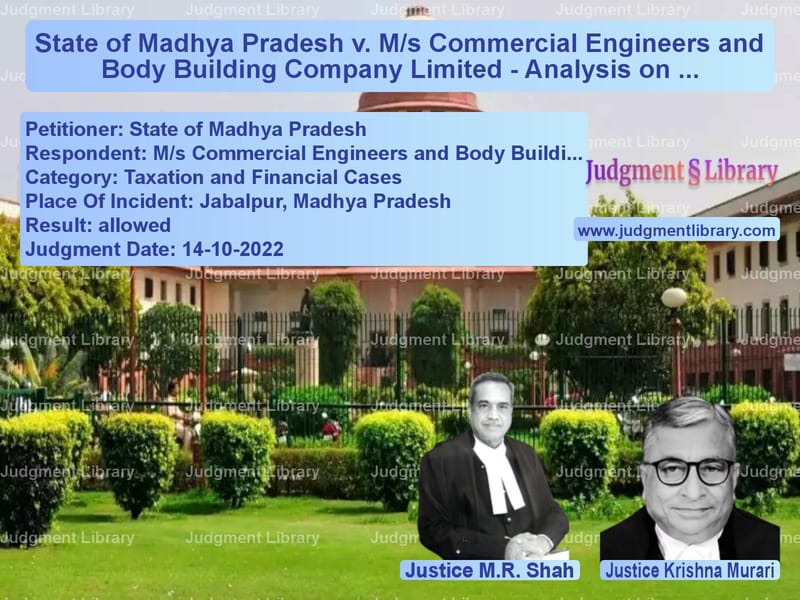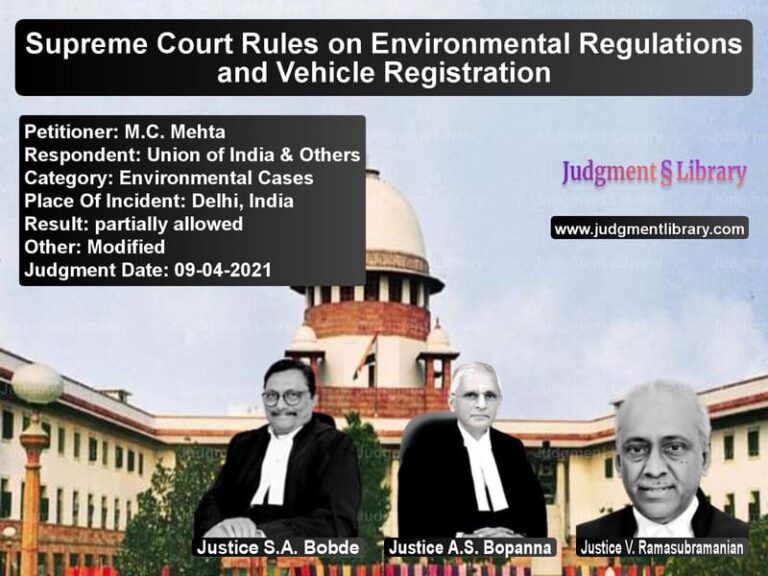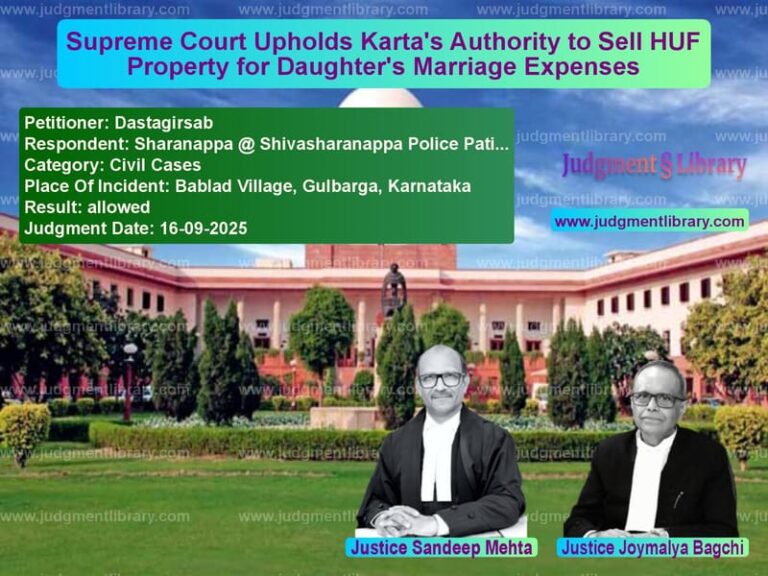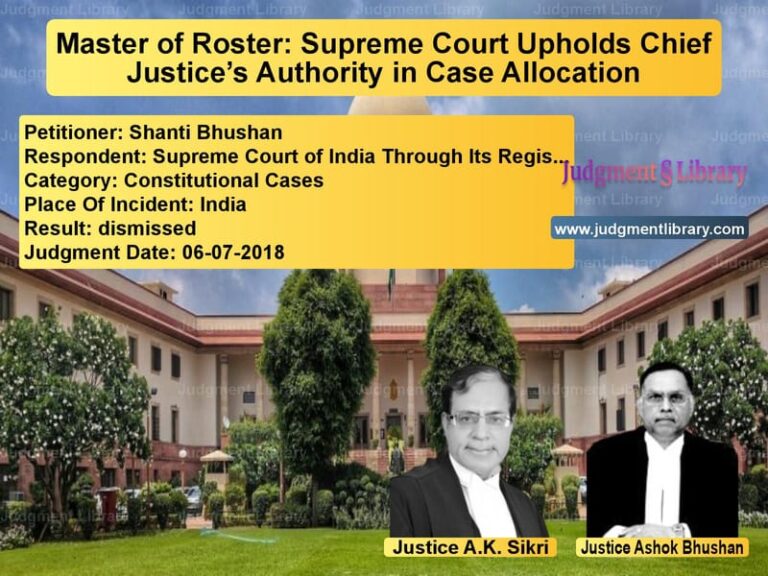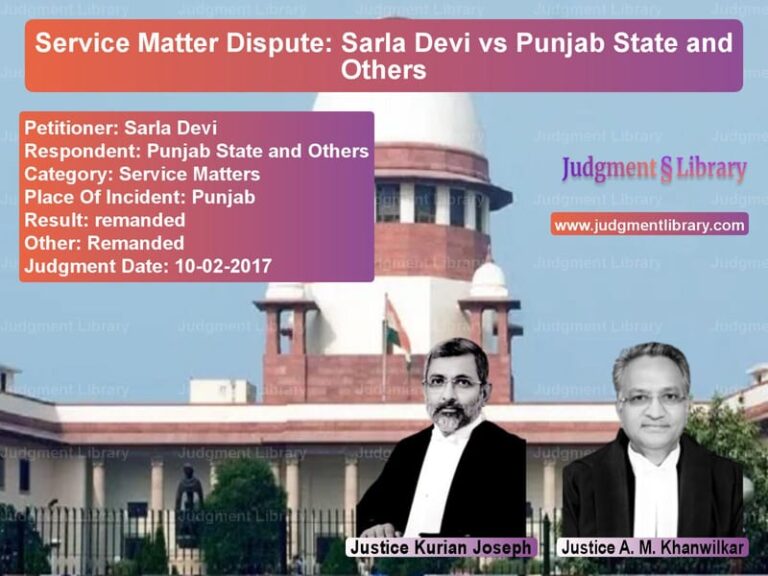State of Madhya Pradesh v. M/s Commercial Engineers and Body Building Company Limited – Analysis on Writ Petition Against Assessment Order
The case involves the State of Madhya Pradesh challenging the judgment passed by the High Court of Madhya Pradesh, Principal Seat at Jabalpur, in Writ Petition No. 7628/2015. The writ petition was filed by M/s Commercial Engineers and Body Building Company Limited (the respondent) against the Assessment Order passed by the Divisional Deputy Commissioner, Commercial Tax, Jabalpur, denying the Input rebate under Section 14 of the Madhya Pradesh Value Added Tax Act, 2002 (MP VAT Act, 2002). The High Court had quashed the Assessment Order, and the State of Madhya Pradesh filed the present appeal.
The main issue in this case was whether the High Court was right in entertaining the writ petition against the Assessment Order denying the Input rebate, especially considering the availability of an alternative statutory remedy of appeal under Section 46(1) of the MP VAT Act, 2002. The High Court had observed that no disputed questions of fact were involved and the matter could be decided based on the admitted facts.
Petitioner and Respondent Arguments
Petitioner’s Arguments:
- The petitioner, the State of Madhya Pradesh, argued that the High Court should not have entertained the writ petition under Article 226 of the Constitution of India, as there was a statutory remedy of appeal available to the respondent under Section 46(1) of the MP VAT Act, 2002.
- The petitioner further contended that the High Court erred in bypassing the statutory remedy and should have directed the respondent to avail the statutory remedy of appeal instead of entertaining the writ petition.
- The petitioner emphasized that there were disputed questions of fact in the case, which required examination in an appeal, and thus, a writ petition under Article 226 was not appropriate.
Respondent’s Arguments:
- The respondent, M/s Commercial Engineers and Body Building Company Limited, argued that the writ petition was maintainable as the matter involved no disputed questions of fact and could be decided based on admitted facts. The respondent also argued that the High Court was correct in exercising its jurisdiction under Article 226 in such a case.
- The respondent contended that the denial of the Input rebate was an issue that needed to be addressed urgently and could be resolved in the writ petition without requiring an appeal.
- The respondent relied on the High Court’s observation that no inquiry into the facts was necessary, which justified the court’s decision to entertain the writ petition.
Key Issues and Supreme Court’s Ruling
The Supreme Court addressed the main issue of whether the High Court should have entertained the writ petition under Article 226 of the Constitution of India despite the availability of an alternative statutory remedy of appeal under Section 46(1) of the MP VAT Act, 2002. The key points raised by the Court include:
1. Statutory Remedy of Appeal
The Court noted that there was an alternative statutory remedy available to the respondent under Section 46(1) of the MP VAT Act, 2002. The Court referred to the recent judgment in the case of State of Maharashtra v. Greatship (India) Limited, where it was held that when a statutory remedy of appeal is available, the High Court should not entertain a writ petition bypassing the statutory remedy. The Court emphasized that the existence of an alternative remedy should discourage the invocation of extraordinary writ jurisdiction under Article 226 of the Constitution.
2. Disputed Questions of Fact
The Court further held that the High Court’s finding that no disputed questions of fact were involved was incorrect. The Court noted that the matter involved factual inquiries, which made it unsuitable for direct resolution in a writ petition. The Court relied on established judicial principles that matters involving revenue and taxation should generally be addressed through the statutory appeal process rather than writ jurisdiction.
3. Judicial Prudence and Alternative Remedy
The Court discussed the principle of judicial prudence, which dictates that when a statutory appeal is available, a writ petition under Article 226 should be avoided unless the alternative remedy is inadequate or ill-suited for the case at hand. The Court emphasized that tax-related disputes should not be entertained in writ jurisdiction when a statutory remedy exists.
Conclusion
The Supreme Court quashed the judgment passed by the High Court and ruled that the writ petition should not have been entertained. The Court directed the respondent to prefer a statutory appeal under Section 46(1) of the MP VAT Act, 2002, against the Assessment Order. The Court further stated that the appeal should be entertained and decided on merits, without considering the observations made by the High Court in its judgment.
This judgment reinforces the principle that writ petitions under Article 226 of the Constitution should not be entertained when an alternative statutory remedy is available, particularly in matters related to tax and revenue. The ruling also emphasizes the importance of judicial prudence and the need to follow statutory procedures for resolving disputes.
Impact and Implications
The decision in this case highlights the importance of adhering to the statutory remedies provided by the law, particularly in matters involving taxation and revenue. It underscores that courts should exercise their discretion in writ jurisdiction cautiously and respect the availability of alternative remedies. The ruling sets a precedent for similar cases where the statutory remedy of appeal is available and ensures that the process is not circumvented by the filing of writ petitions.
Petitioner Name: State of Madhya Pradesh.Respondent Name: M/s Commercial Engineers and Body Building Company Limited.Judgment By: Justice M.R. Shah, Justice Krishna Murari.Place Of Incident: Jabalpur, Madhya Pradesh.Judgment Date: 14-10-2022.
Don’t miss out on the full details! Download the complete judgment in PDF format below and gain valuable insights instantly!
Download Judgment: state-of-madhya-prad-vs-ms-commercial-engin-supreme-court-of-india-judgment-dated-14-10-2022.pdf
Directly Download Judgment: Directly download this Judgment
See all petitions in Income Tax Disputes
See all petitions in Tax Evasion Cases
See all petitions in Banking Regulations
See all petitions in Tax Refund Disputes
See all petitions in Judgment by Mukeshkumar Rasikbhai Shah
See all petitions in Judgment by Krishna Murari
See all petitions in allowed
See all petitions in supreme court of India judgments October 2022
See all petitions in 2022 judgments
See all posts in Taxation and Financial Cases Category
See all allowed petitions in Taxation and Financial Cases Category
See all Dismissed petitions in Taxation and Financial Cases Category
See all partially allowed petitions in Taxation and Financial Cases Category

